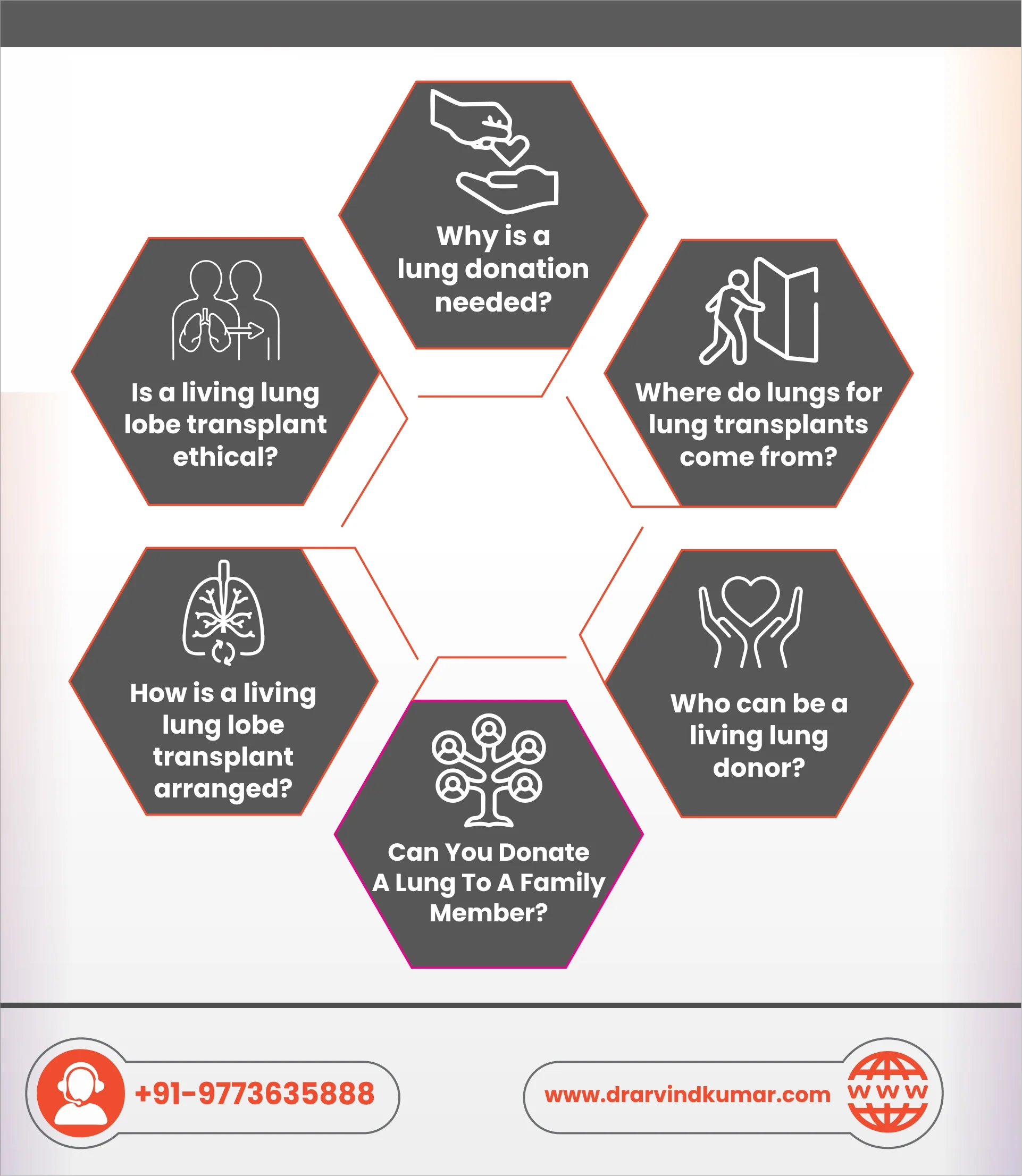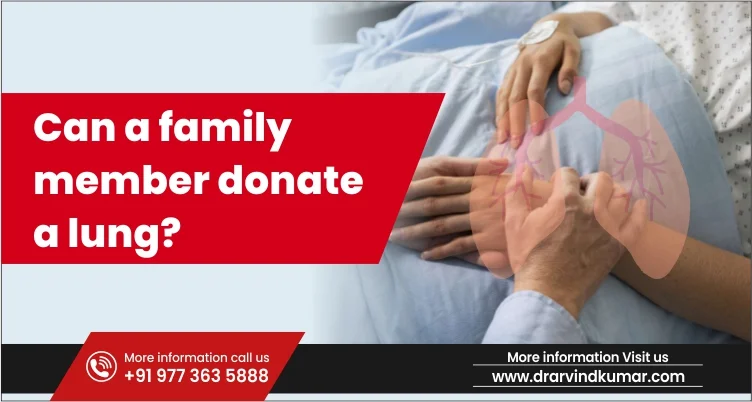Why is a lung donation needed?
It may be challenging for the body to obtain the oxygen it needs to survive if the lungs are unhealthy or damaged. Medication or specialized breathing equipment can frequently be used to address lung injury. A lung transplant may be required if these treatments are ineffective or if the patients lung function becomes life-threatening.
Numerous illnesses and conditions, including COPD (chronic obstructive pulmonary disease), which includes emphysema, lung scarring known as pulmonary fibrosis, cystic fibrosis, sarcoidosis with advanced fibrosis, and pulmonary hypertension, can harm the lungs and impair their ability to function effectively.
Where do lungs for lung transplants come from?
The majority of transplanted lungs are from people who have passed away. The term “cadaveric transplant” refers to this kind of procedure. A donor is often a deceased person, although, in extremely rare circumstances, a lung piece can be removed from a living donor.
Adults who are healthy, non-smokers, and a good match could be able to donate a portion of one of their lungs. The lungs component is referred to as a lobe. A live transplant is a name given to this kind of transplant. People who donate a lung lobe can continue to use their remaining lungs normally. Can a lung transplant cure COPD?
Who can be a living lung donor?
Lung donation is normally done after death, however, in extremely rare cases, it is possible to become a living lung donor. Because the surgery is currently uncommon due to a wide gap between organ donors and recipients, everyone who is willing to donate is encouraged to do so for the following reasons:
- Before any lung transplant surgery is performed, your organs will be evaluated.
- All major religions endorse lung donation.
- Most people are eligible to donate, and there are relatively few health-related limitations.
Only the transplants with the highest likelihood of success can be performed since there are not enough lung donors to meet the demand. This indicates that some people wait for a very long time in a lot of pain and struggle.

Can You Donate A Lung To A Family Member?
When a family member decides that they want to donate a part of their lung to save the life of their loved ones, this procedure will be a Lung transplant with a living donor. It is important to investigate the donors motivations. No payment or other form of reward is permitted.
The most common justification people have for donating a lung is to ensure that a loved one lives, or at least has a higher quality of life for a while, which is certainly a noble goal. A person may be able to get a lung transplant from a living donor (2 living donors are usually required for 1 recipient). Lung transplants from living donors do occur, although they are extremely uncommon.
In this kind of lung transplant, the lower right lobe of one donors lung and the lower left lobe of the other donors lung are each removed. In a single operation, the donor lung implants are used to replace the recipients both lungs.
The majority of recipients of living lung transplants have cystic fibrosis and are related to the donors. The receiver and donors must be of similar sizes and have compatible blood types.
How is a living lung lobe transplant arranged?
Potential donors must belong to the right blood group, which means certain family members cannot donate. Donors get in-depth counseling to ensure they are aware of the risks, including those related to morbidity and mortality. The donor is provided with written literature outlining the modest hazards in detail.
All donors will feel some post-operative discomfort, and a chest tube will remain in place for at least a few days. In most cases, the chest tube is only left in place for one to three days, but in rare occasions, a donor may need to have their chest tube for up to three weeks. Postoperative infections and other uncommon postoperative problems are also a possibility, albeit a tiny one.
Around the world, the mortality rate of people who have donated a lung lobe is incredibly low. Donors typically do not encounter any severe or fatal consequences. The donor will be able to live a normal life in all other respects but will have reduced physical tolerance for activities like competitive sports if they have four lung lobes as opposed to five. However, he or she will have less lung tissue available if they go on to get lung cancer or a serious chest infection.
Potential donors have the right to change their minds at any point throughout the evaluation process, and the other family members are not informed of the reasons they were deemed unsuitable, such as medical, psychological, or change of heart issues.
All prospective donors get a medical evaluation, and a psychiatrist also conducts an interview with them. They confirm that the possible donor has a clear understanding of the risks and reevaluates the motive of the individual. Its crucial that potential donors understand they can only make this kind of donation once, and the patient still has a chance of passing away.
Is a living lung lobe transplant ethical?
Due to a lack of organ donors, teenagers, adolescents, and even adults are passing away. Anyone who cares about them and wants to help save their lives by donating an organ can do so. However, not all patients have relatives who are healthy enough and ready to donate organs. If 25% of patients could be cured by accepting a familial organ donation, there would be more cadaveric donors available for other patients who are waiting to be treated.
It is also crucial to realize that the family member who wishes to donate their lung to the patient is under no duty or pressure, either from the patient, from another member of the family, or from staff members at the transplant hospital.
Without pressuring the patient, it is mentioned that receiving a lung from a loved one is an option when getting ready for a regular lung transplant. The family members who opt to donate can request that the transplant team investigate and further discuss the situation. Understandably, some patients do not want their family members to undertake this risk on their behalf.
Having said that, if a family member volunteers as a lung donor for a patient who is their family member, extreme caution and extensive screening are done to make sure that both the recipient and the donor can lead healthy lives after the lung transplant.
Conclusion
Lung disease can be hard to live with, both for the patient and their loved ones. Patients with end-stage lung illness can have a significant improvement in quality of life after receiving a lung transplant.
Some lung donors who donate a portion of their organs to a family member express their gratitude for the chance to try and save their loved one. When the surgery is successful, this is understandable because their father, wife, or daughter receives a new lease on life, all thanks to them.
Even if the patient passes away, the donor family member expresses their gratitude for having been given the chance to make this final effort to help their loved one.
Consequently, a living lung lobe donation may be performed if thorough assessment and counseling are done and it complies with local legal criteria. Indeed, it appears to be completely permissible from both a modern secular ethical point of view as well as from a compassionate standpoint to offer something one can do without, at minimal danger to oneself, which can save the life of another human being.
FAQs
1. Can my lung donation for my family member be rejected by the doctors?
The surgeons are respecting the autonomy of the potential donors by performing living lobe transplanting in an effort to save the life of another. The autonomy of the medical team must also be respected, and they must have the freedom to reject a possible donor if they believe they are at high risk as a result of the medical evaluations. The medical staff always adheres to the minimal risk philosophy.
2. Can I donate a lung to a family member who is in the need of a transplant?
A complete lung cannot be donated, technically. Some transplant hospitals and centers perform, living donor lung transplants. In such procedures, the recipients left lung—which has two lobes— and the lower lobes of a donors right lung—which has three lobes—are combined. Using lobes from both parents, this was initially done for young kids who might not make it through the lengthy transplant waiting period. It is advisable to check first because not all centers provide this kind of procedure, nor is it a possibility for everyone. Additionally, it needs two donors whose tissue matches those of the recipient.

.webp)





